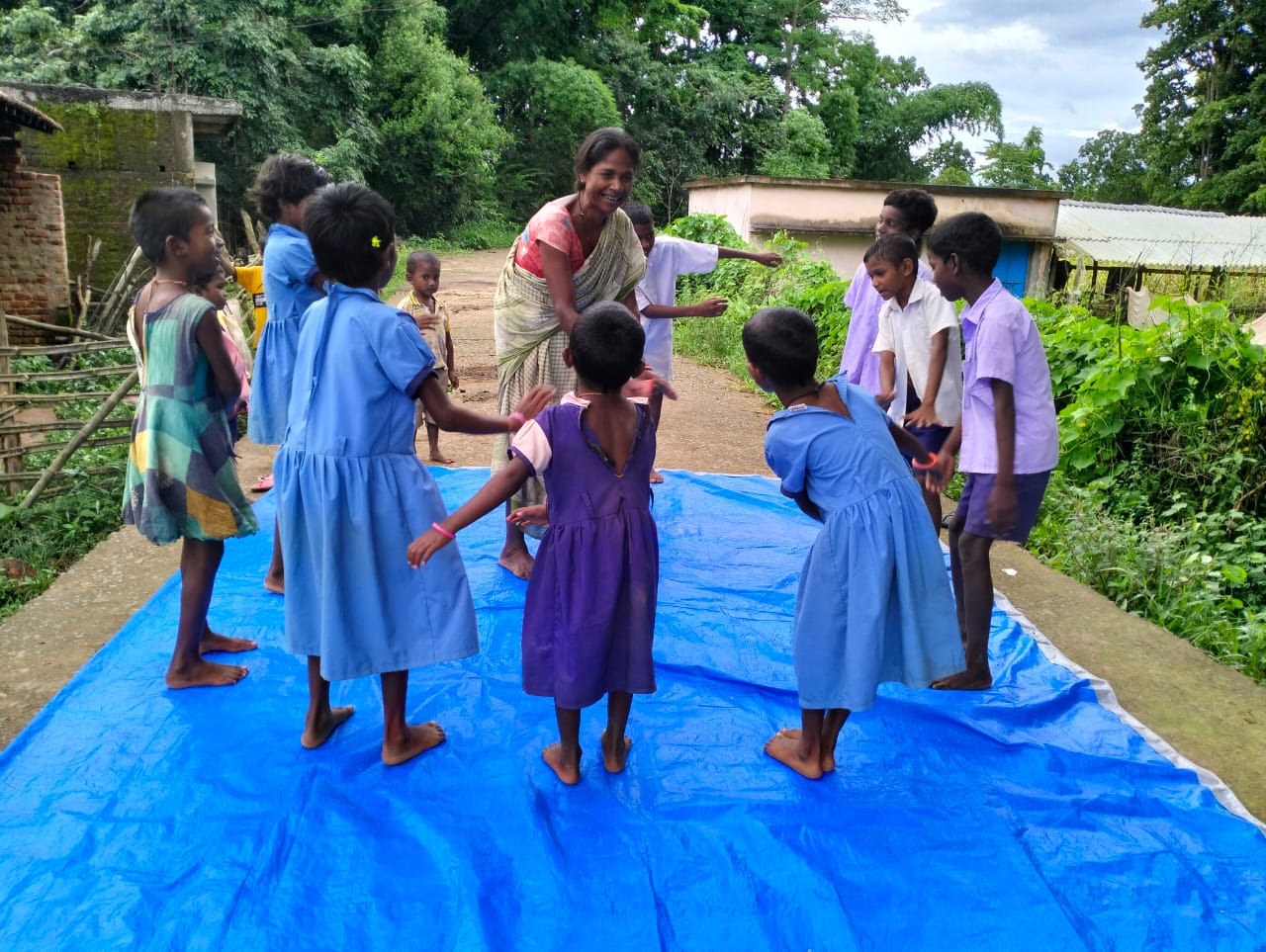Bal Sabha boosts confidence in children and reinforce positive behaviour
StoryBy Chandrika Patnaik
1 February 2023
Children engage in activities that boost their confidence and understanding of each other better in order to represent their interests in the village better.

Child members of Bahajan Sishu Sangathana having a leisure time.
Photograph by Ananta Tudu
Saraswati Majhi, 36, is a resident of Asanbani village and mother of two primary school-going children. She takes pride in talking about her children. Her daughter Panasari, who is nine years old, insists that Saraswati washes her hands every time before cooking. Panasari helps her mother clean the kitchen once everyone at home has had their meals. Saraswati says her son Purushottam who is eleven years old, used to run out of the house earlier to urinate in the open. These days he only uses the toilet. Both her children insist on wearing clean clothes and comb their hair daily. Her children are members of a Bal Sabha called Bahajan Sishu Sangathana, in Asanbani village, Saharapada block in Keonjhar district. There are other parents who share the same enthusiasm as Saraswati.
Dasarathi Marandi, 35, father of Miki Marandi, 7, says his daughter does not allow anyone in the family to dip their hands into vessels of water as the water gets contaminated. Dasarathi feels that ever since Miki became a member of the Bal Sabha, she has started wearing clean clothes and cuts her nails regularly and has been asking family members to follow basic hygiene.
All these have been the outcomes of the Bal Sabha which was formed in October 2021 in Asanbani village. The members of the Bal Sabha sit twice in a month. There are 18 boys and girls in the group, in the age range of 6-12 years and there is a volunteer from their own village who facilitates the prescribed activities of the Bal Sabha at the village level. Through the sessions conducted on personal health and hygiene, children got sensitised enough which led them to pick up good habits like washing hands regularly, using the toilet and bathroom, and maintaining personal hygiene.
Bal Sabha serves as institutional platforms for the holistic development of rural children. Being a member of the Bal Sabha gives them opportunities to engage in a range of activities within their village that also boosts their confdence and understanding of each other. The activities in a Bal Sabha are interactive and this includes singing, dancing, playing games, and attempting quizzes together.
Ananta Tudu, 57, Secretary of the VDC, says that he was pleased to see children from his village, for the very frst time, participate in the General Body Meeting (GBM) held in the village and set an example by placing their demands for cricketing gear and equipment. Earlier, only adult members of the village community attended the GBM, and issues of the children were often not discussed in the meetings. Through the Bal Sabha, children are encouraged to participate in the village meetings so that they can become a part of the development process of the village from a very young age itself and gradually be groomed into future leaders of the community.
It has created visible differences in the classroom transactions too. Rambhabati Tanti, 46, teacher at the Prathamika Bidyalaya in Asanbani village says children’s attendance in the school has improved. She feels that having a group where children get to interact with other children, indulge in recreational activities, and read story books and comics, has helped them become more confident and responsible individuals.
Children reading the story books from the mobile library.
Photograph by Ananta Tudu
ACKNOWLEDGEMENT
Gaurab Mahapatra, Thematic Coordinator Planning Monitoring Documentation and Communication and Parakshita Nayak, Thematic Coordinator, Village Institutions. Mark Lancy Sebastian edited this story.
ABOUT THE AUTHOR
Chandrika Patnaik leads content production within the Communications team in Gram Vikas.
RELATED BLOGPOSTS
No school nearby, so they built one themselves
Facing distance and neglect, Adivasi families in Odisha built their own tuition centre for children.
Turning canal overflow into crop success
Small farmers unite to secure water and improve crop yields with a check dam.
When the rains took their goats, they found a way to rebuild
In a village in Odisha, Keshab and Pramila’s goat shed brought healthier animals, steady income, and a model others want to learn from.